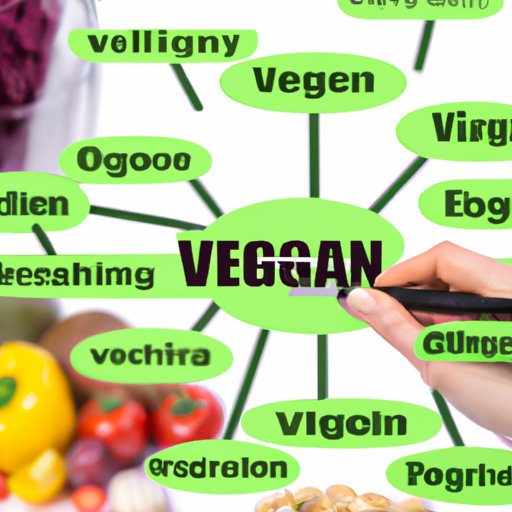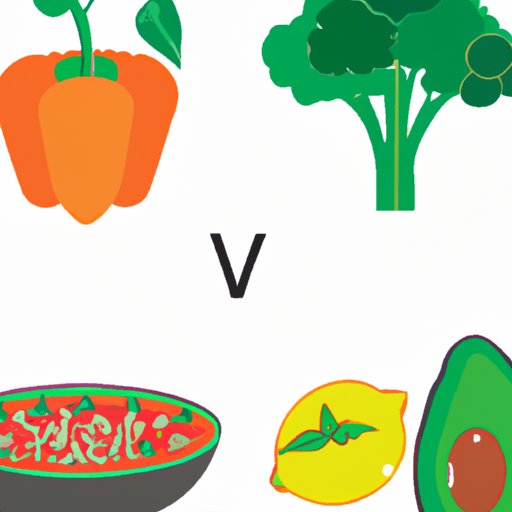Introduction
Veganism is a lifestyle choice that has become increasingly popular in recent years. It involves refraining from consuming any animal products, such as meat, dairy, eggs, and honey. People may choose to follow a vegan diet for ethical, environmental, or health reasons. In this article, we’ll explore the potential health benefits and risks associated with eating a vegan diet.

Examining the Nutritional Benefits of Eating a Vegan Diet
A vegan diet can be a nutritionally sound way to eat if it includes a variety of plant-based foods. A balanced vegan diet should include adequate amounts of macronutrients, vitamins, and minerals. For example, according to a study published in Nutrients, plant-based diets are associated with higher intakes of fiber, magnesium, folic acid, vitamins C and E, iron, and phytochemicals, compared to non-vegetarian diets.
In addition, there is a wide variety of plant-based foods available to vegans, such as fruits, vegetables, nuts, seeds, grains, legumes, and soy products. Eating these foods can help ensure that vegans get the essential nutrients they need, while also providing a range of different flavors and textures.
Eating a vegan diet may also reduce the risk of developing certain chronic diseases. A systematic review published in Nutrition Reviews found that vegetarian and vegan diets were associated with lower blood pressure, lower cholesterol levels, and a lower risk of type 2 diabetes compared to omnivorous diets.
Exploring the Environmental Impact of Eating a Plant-Based Diet
Eating a vegan diet can also have a positive environmental impact. Animal agriculture has a significant impact on land and water resources, as well as on air quality. According to a study published in Frontiers in Sustainable Food Systems, reducing animal product consumption could lead to a decrease in land use by up to 76 percent. The study also found that reducing animal product consumption could reduce water use by up to 99 percent, and greenhouse gas emissions by up to 73 percent.

Investigating the Health Risks Associated with Eating a Vegan Diet
Though there are many potential health benefits associated with eating a vegan diet, there are also some potential risks. One of the main concerns is nutrient deficiencies, as vegan diets may lack some key nutrients, such as vitamin B12, iron, and calcium.
Vitamin B12 is an essential nutrient found mainly in animal products, such as meat, eggs, and dairy. Without adequate intake of vitamin B12, vegans may be at risk of developing a deficiency. According to a study published in Nutrients, vegans should supplement their diets with vitamin B12 or consume fortified foods to ensure adequate intake.
Iron is another nutrient that vegans may be at risk of lacking. While iron is present in many plant-based foods, it is not as bioavailable as the form found in animal products. Therefore, vegans should include foods high in iron, such as legumes, nuts, and seeds, in their diets. Additionally, consuming foods rich in vitamin C, such as citrus fruits, tomatoes, and bell peppers, can help increase the absorption of iron from plant-based sources.
Calcium is another important nutrient that vegans should pay attention to. Good sources of calcium for vegans include dark leafy greens, tofu, almonds, sesame seeds, and fortified plant milks.
Comparing the Nutritional Value of Vegan and Non-Vegan Foods
When transitioning to a vegan diet, it is important to consider the nutritional value of vegan foods compared to non-vegan foods. Plant-based proteins, such as beans, lentils, and quinoa, are good sources of protein for vegans. However, they do not contain all of the essential amino acids found in animal proteins. Therefore, vegans should aim to include a variety of different plant-based proteins in their diets.
When it comes to dairy substitutes, such as almond milk and soy milk, it is important to read the labels carefully. Some dairy substitutes may be low in protein and other essential nutrients, so it is important to look for products that are fortified with vitamins and minerals. Additionally, omega-3 fatty acids are essential for optimal health, but they are not found in plant-based foods. Therefore, vegans should supplement their diets with omega-3 fatty acids from sources such as flaxseed oil, chia seeds, and walnuts.
Analyzing the Long-Term Effects of a Vegan Diet on Overall Health
Eating a vegan diet can have numerous long-term health benefits. Studies have shown that vegan diets can aid in weight management, as well as reduce the risk of certain cancers and heart disease. For example, a study published in Nutrients found that following a vegan diet was associated with a lower risk of obesity, hypertension, type 2 diabetes, and cardiovascular disease. Additionally, a systematic review published in Nutrition Reviews found that vegan diets were associated with a reduced risk of some types of cancer, including breast and colorectal cancer.
Exploring the Economic Benefits of Eating a Vegan Diet
Eating a vegan diet can also provide economic benefits. Plant-based foods tend to be less expensive than animal products, which can help reduce grocery costs. Additionally, following a vegan diet may lead to fewer medical expenses, as studies have linked vegetarian and vegan diets to a lower risk of many chronic diseases.
Conclusion
Overall, eating a vegan diet can be a nutritionally sound way to eat, with potential health benefits in terms of weight management, risk of chronic diseases, and environmental sustainability. However, vegans should be aware of potential nutrient deficiencies, and should strive to include a variety of plant-based foods in their diets. Additionally, vegan diets can provide economic benefits in terms of reduced grocery and medical costs. For those looking to transition to a vegan diet, it is important to consult a healthcare professional to ensure adequate nutrient intake.
(Note: Is this article not meeting your expectations? Do you have knowledge or insights to share? Unlock new opportunities and expand your reach by joining our authors team. Click Registration to join us and share your expertise with our readers.)
